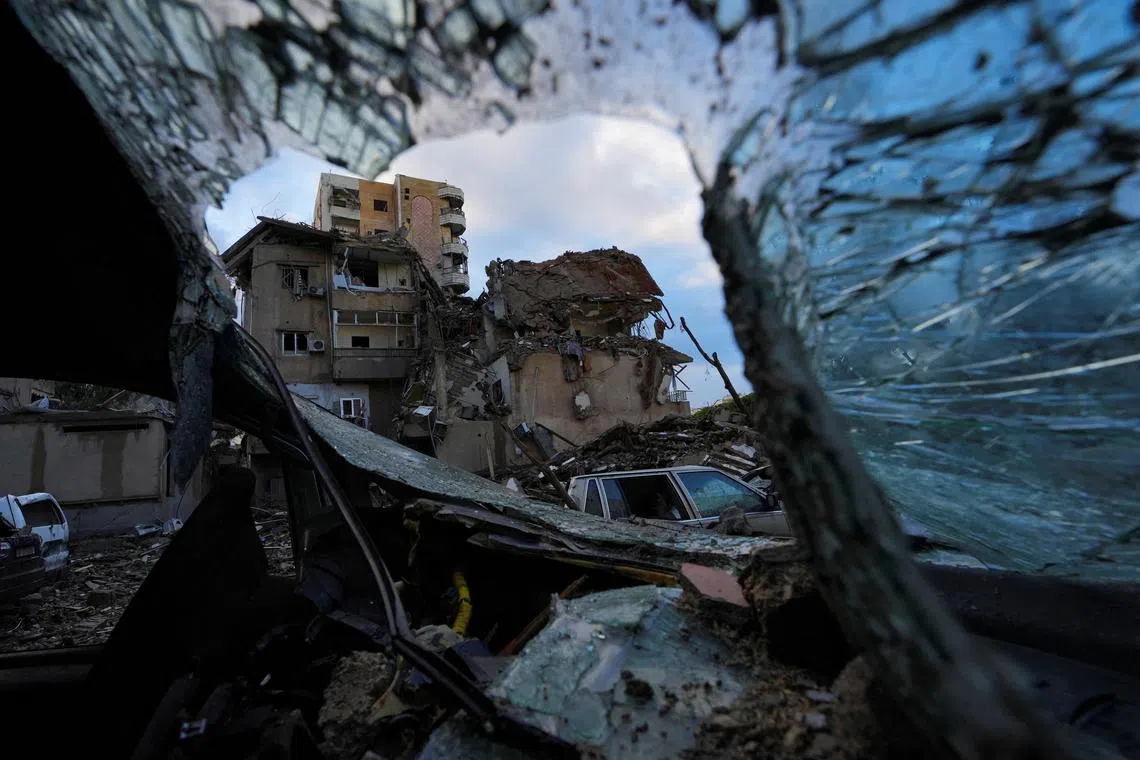Israel carries out air strikes in Beirut ahead of anticipated ceasefire deal
Sign up now: Get ST's newsletters delivered to your inbox

The UN rights chief voiced concern about the escalation of hostilities in Lebanon, where nearly 100 people were killed by air strikes in recent days.
PHOTO: REUTERS
JERUSALEM/BEIRUT – Israeli warplanes hit Beirut’s southern suburbs with a wave of air strikes on Nov 26, just before Israel’s Cabinet met to discuss a ceasefire deal with its Hezbollah foes.
A senior Israeli official and Lebanese Foreign Minister Abdallah Bou Habib appeared optimistic that a deal could be reached, clearing the way for an end to a conflict that has killed thousands of people since it was ignited by the Gaza war in 2023.
Despite the possibility of an imminent diplomatic breakthrough, hostilities raged on Nov 26.
Israeli strikes smashed more of Beirut’s densely populated southern suburbs, a Hezbollah stronghold, with the Israeli military saying one barrage of strikes had hit 20 targets in the city in just 120 seconds.
Israel had issued its biggest evacuation warning yet, telling civilians to leave 20 locations.
Israeli military spokesman Avichay Adraee said the air force was conducting a “widespread attack” on Hezbollah targets across the city.
The Iran-backed Hezbollah has kept up rocket fire into Israel.
The UN’s rights chief voiced concern about the escalation of bloodshed in Lebanon and his office said nearly 100 people had been reported killed by Israeli air strikes in recent days, including women, children and medics.
Israel’s Security Cabinet under Prime Minister Benjamin Netanyahu was due to start meeting at 10pm Singapore time for up to three hours to discuss the ceasefire deal, which a senior Israeli official said was likely to be approved.
This would pave the way for a ceasefire declaration by US President Joe Biden and French President Emmanuel Macron
At a conference in Rome, Mr Bou Habib expressed hope that a deal to end the deadliest spillover from the Gaza war could be sealed by the evening of Nov 26.
However, there was no indication that a truce in Lebanon would hasten a ceasefire and hostage-release deal in devastated Gaza, where Israel is battling Palestinian militant group Hamas.
The agreement requires Israeli troops to withdraw from south Lebanon and Lebanon’s army to deploy in the region – a Hezbollah stronghold – within 60 days, officials say. Hezbollah would end its armed presence along the border south of the Litani River.
Mr Bou Habib said the Lebanese army would be ready to have at least 5,000 troops deployed in southern Lebanon as Israeli troops withdraw, and that the US could play a role in rebuilding infrastructure destroyed by Israeli strikes.
Israel demands effective UN enforcement of an eventual ceasefire with Lebanon and will show “zero tolerance” towards any infraction, Defence Minister Israel Katz said on Nov 26.
The agreement with Lebanon will maintain Israel’s freedom of operation there to act in defence to remove threats posed by Hezbollah and enable displaced residents to return safely to their homes in northern Israel, Israeli government spokesman David Mencer said.
Israel has dealt Hezbollah massive blows since going on the offensive against the group in September, killing its leader, Hassan Nasrallah, and other top commanders, and pounding areas of Lebanon where the group holds sway.
“Regarding the ceasefire, I think it will be implemented. Both sides are tired,” said Mr Selim Ayoub, a 37-year-old mechanic from Beirut’s southern suburbs.
Hezbollah launched some 250 rockets
The northern Israeli city of Nahariya came under more rocket fire overnight.
Diplomacy to end the fighting has focused on restoring a ceasefire based on UN Security Council Resolution 1701, which ended the last major war between Hezbollah and Israel in 2006.
Israel’s Ambassador to the United Nations, Mr Danny Danon, said on Nov 25 that Israel would maintain the ability to strike southern Lebanon under any agreement.
Lebanon has previously objected to Israel being granted such a right, and Lebanese officials have said such language is not included in the draft proposal.
Two Israeli officials told Reuters that Israel has a side agreement with the US allowing it to take action in Lebanon against “imminent threats”.
Hezbollah, seen as a terrorist group by Washington, has endorsed its ally, Parliament Speaker Nabih Berri, to negotiate.
Israeli Deputy Foreign Minister Sharren Haskel said that while there were other missions Israel could undertake in Lebanon to dismantle Hezbollah, it preferred a diplomatic solution if possible.
Over the past year, more than 3,750 people have been killed in Lebanon and over one million have been forced from their homes, according to Lebanon’s Health Ministry, which does not distinguish between civilians and combatants in its figures.
The widespread destruction left by Israeli air strikes has brought into focus a huge reconstruction bill awaiting cash-strapped Lebanon, with many left homeless heading into winter.
Hezbollah strikes have killed 45 civilians in northern Israel and the Israeli-occupied Golan Heights. At least 73 Israeli soldiers have been killed in northern Israel, the Golan Heights and in combat in southern Lebanon, according to the Israeli authorities.
A ceasefire would pave the way for 60,000 people to return to homes in northern Israel, which they evacuated as Hezbollah began firing rockets in support of its Palestinian ally Hamas a day after that group’s assault on Oct 7, 2023.
Foreign ministers from the Group of Seven democracies on Nov 26 upped the pressure on Israel to accept a ceasefire deal with Hezbollah, saying “now is the time to conclude a diplomatic settlement”.
In a draft statement at the end of a two-day meeting in Italy, the G-7 ministers urged Israel to facilitate humanitarian aid delivery to Palestinians, and condemned increasing settler violence in the West Bank.
The ministers also condemned a recent attack on the UN peacekeeping mission in Lebanon and expressed their support for UN Palestinian refugee agency UNRWA, saying it plays a “vital role”. REUTERS


